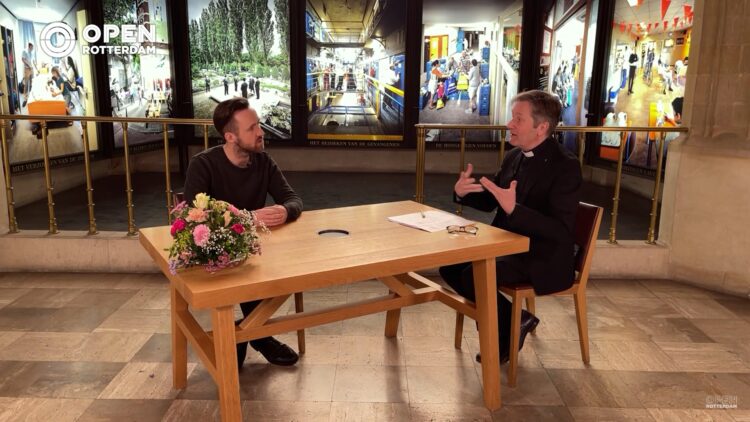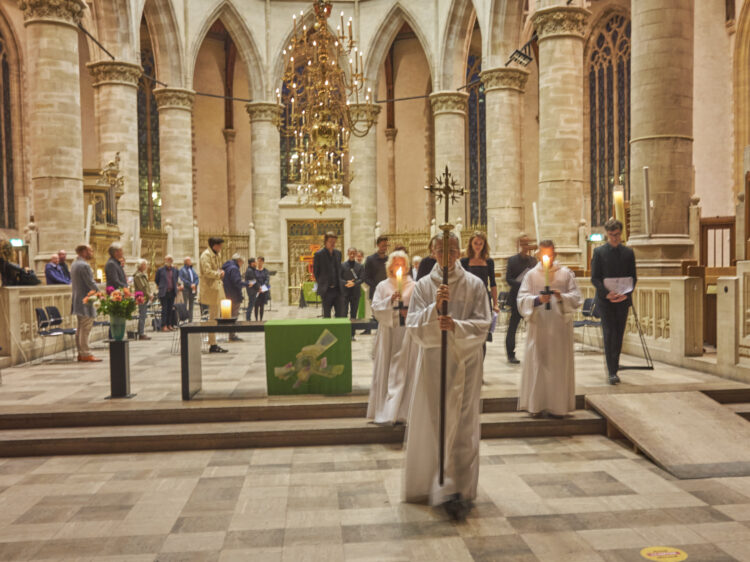
Op zondag 14 maart is humanistisch raadsman Michiel van Agt te gast in de Laurenskerk. Dominee Harold Schorren interviewt hem over de rol van ‘het kleden van de naakten’ (één van de werken van barmhartigheid) binnen het Humanisme.

Op zondag 14 maart is humanistisch raadsman Michiel van Agt te gast in de Laurenskerk. Dominee Harold Schorren interviewt hem over de rol van ‘het kleden van de naakten’ (één van de werken van barmhartigheid) binnen het Humanisme.

Op zondag 7 maart was pandit Stephen Rawinder te gast in de Laurenskerk. Dominee Harold Schorren interviewt hem over de rol van ‘het onderdak bieden aan de vreemdeling’ (één van de werken van barmhartigheid) binnen het Hindoeïsme. De pandit vertelt ons o.a. hoe wij allemaal vreemdelingen zijn en daarnaast ook één familie. De gastvrijheid is binnen het hindoeïsme dan ook een groot goed. Pandit Stephen Rawinder is hindoeïstisch priester bij Arya Samaj en uitvaartbegeleider in Rotterdam.

Op zondag 28 februari was dominee Katinka Broos te gast in de Laurenskerk. Katinka Broos is predikant binnen de protestantse kerk en coördinator/pastor bij Stichting Wijkpastoraat Rotterdam West. Dominee Harold Schorren interviewt haar over de rol van ‘het laven van de dorstigen’ (één van de werken van barmhartigheid) binnen het christendom. In het interview horen we onder andere over haar liefde voor het verhaal over de ontmoeting tussen Jezus en de Samaritaanse vrouw bij de Jakobsbron en hun gesprek over ‘levend water’.

Op zondag 21 februari was rabbijn Albert Ringer te gast in de Laurenskerk. Dominee Harold Schorren interviewt hem over de rol van ‘het bezoeken van de zieken’ (één van de werken van barmhartigheid) binnen het Jodendom. We zullen o.a. horen hoe het doen van werken van barmhartigheid een imitatio Dei is, een imiteren van God. Albert Ringer is rabbijn van de Liberaal Joodse Gemeente in Rotterdam en werkzaam als geestelijk verzorger bij Parnassia in Den Haag.

All are invited to this service in English, with the Laurensensemble, conducted by Wiecher Mandemaker, Hayo Boerema (organ) and Rev. Mirella Klomp.
We pray Psalm 80. The Lessons are Zephaniah 3.14-20 and Luke 1.5-20.
Preces and responses are composed by Hayo Boerema (1972*), the Magnificat and Nunc Dimittis by John Blow (1649-1708). The anthem is ‘Man dream no more’, Martin Peerson (1572-1650). The hymns are ‘Come, thou long-expected Jesus’ and ‘Hark the glad sound! The Saviour comes’. We hear the organ voluntaries ‘Von Gott will ich nicht lassen‘ (J.S. Bach, BWV 658) and ‘Von Gott will ich nicht lassen’ (J.L. Krebs).
Evensong is the form of Evening Prayer that is distinctive to the Church of England and other Churches of the Anglican Communion. It includes elements from the medieval Latin evening services or Vespers and Compline, and has been largely unchanged since the first English language Book of Common Prayer of 1549.
The heart of the service consists of the following sequence. After the opening responses sung by the Minister and Choir, the root of the Christian faith in the Old Testament are acknowledged by the singing of Psalms, and by the reading of the First Lesson from the Old Testament. The Choir then sing Magnificat, the Blessed Virgin Mary’s words of praise, as recorded by St Luke, when she had been greeted by Elizabeth as the Mother of the Lord. The Second Lesson is from the New Testament. The Choir sings Nunc Dimittis, again from St Luke’s Gospel, the words of Simeon when he recognised the infant Christ as the light of the nations and the glory of Israel. After an affirmation of faith in the Creed, there are more sung prayers and an Anthem.
The cathedrals and other great churches of the Anglican Communion maintain a strong choral tradition, of which the singing of Evensong on most days of the week is an important part. As is customary at Choral Evensong, much of the service is sung by the Choir alone to special settings. We are all invited to make or own offering of worship in every part of the service, whether we ourselves are silent, listening, speaking or singing. We do not remain seated if attending a concert, but as worshippers we stand for the canticles, hymn and Creed, sit to hear Gods’ word, and kneel or sit to pray.

Ontvang elke dag van de Adventstijd een tekst, een plaatje, een gedicht in uw mailbox!
Op 29 november begint de Adventstijd en gaan we op weg naar het Hoogfeest van Kerst. Gewoonlijk is het een bijzondere tijd van voorbereiding, een weg die we als gemeente gezamenlijk gaan, om samen ook de geboorte van Jezus uitbundig te vieren. De eerlijke voorspelling is dat we ook in de Advent en met Kerst veel minder fysiek bij elkaar kunnen zijn.
Om toch – zij het op afstand – verbonden te blijven op de weg van Advent willen wij een Dagelijkse Adventsbrief rondsturen, zoals u ook Morgen is het Zondag ontvangt. Iedere dag een tekst, een plaatje, een gedicht… Elke dag weer anders. Samen maken we er een boeiende, inspirerende en mediterende Adventstijd van!